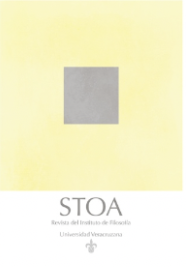Abstract
Great primates have been an endangered species for more than fifty years. The continued pressure that humans make in the habitants and rainforests around the glove have pushed chimpanzees, bonobos, orangutans, and gorillas to the very limits of their well-being. Nowadays there exists a big international pressure, which aims to release primates from their captive environments in zoos, or to promote the development of laws that protect these animals from suffering, hunting, and captivity. In order to accomplish this pursuit, it would be a great movement ahead to recognize the four species of great apes (aside of humans) as non-human persons giving them rights under which the law would protect them from human activities in their natural habitats and the captive situation they live in many countries around the globe.
STOA is a biannual publication edited by the Institute of Philosophy of the Universidad Veracruzana, Tuxpan, No. 29, Frac. Veracruz, C.P. 91020, Xalapa, Ver., Tel. 8154285, http://www.uv.mx/filosofia. Responsible editor: Jesús Turiso Sebastián. Exclusive Use Rights Reservation No. 04-2008-121012511200-203, granted by the Copyright Reservation Directorate of the National Institute of Copyright of the Secretariat of Public Education, ISSN: 2007-1868. Responsible for the last modification of this issue: Jesús Turiso Sebastián, Tuxpan, No. 29, Frac. Veracruz, C.P. 91020, date of last modification August 5, 2011. Distribution and digital support by the Academic Software Development Department of the Universidad Veracruzana.
The opinions expressed by the authors do not necessarily reflect the position of the editor of the publication. Reproduction by any means of the texts published in this journal may be done as long as the source is cited, including the name of the author, the name and number of the journal, and its electronic address. For more information write to revistastoa@uv.mx.
Revista Stoa is a completely free publication, with no cost for processing or receiving articles and free access.
This work is under a Creative Commons Attribution-NonCommercial-ShareAlike 4.0 International license.

